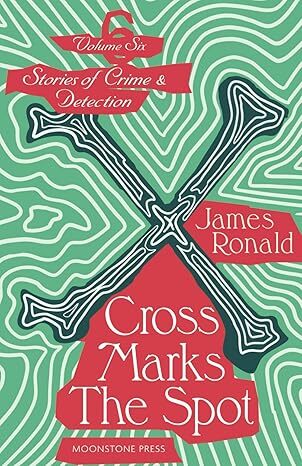Cross Marks The Spot

A review of Cross Marks the Spot by James Ronald – 240726
The sixth volume of James Ronald’s work reissued by Moonstone Press features Cross Marks the Spot, originally published in 1933. It bears all the hallmarks of being written quickly, the plot has as many holes as a colander, but the saving grace is that Ronald can write and is a compelling story teller. He has the ability to draw his reader in, no matter how ludicrous or cliched his story may be. It is a little verbose and I was not surprised to learn in the excellent introduction from Chris Verner that it was rewritten and abridged, appearing as The Frightened Girl under Ronald’s nom de plume of Michael Crombie in 1941.
Ronald takes into the world of the film industry, populated by megalomaniac film directors, in this case Gustav von Blon, the desperate owners of the Colossal Film Company in the shape of Jacob and Hyman Singerman, and naïve actresses who are desperate to make their mark in the industry. Cicely Foster is invited back to Jacob’s flat to discuss a potential role, is subjected to unwelcome advance, fights back and Singerman falls striking his head. She flees the scene but is observed by a small man lurking in the shadows and, more importantly, by a reporter, “The bloodhound of Fleet Street”, Julian Mendoza, who uses his position to investigate the case because, unfortunately for Cicely, Singerman is found dead shortly afterwards, having been shot between the eyes.
The portrayal of Cicely is surprisingly nuanced. I feared the worst when I came across this passage: “And then, having swooned like any twittering miss of the period before women put behind the all that is unmanly, Cicely completed her ignominious descent from the proud heights of twentieth century independence by melting into tears” (page 91). But she is made of sterner stuff and goes out of her way to help the drunken actor, Philip Dressler, irrespective of the cost to her reputation and sardonically thanks her fiancé, Kenneth Archer, for attempting to settle her future without any mental input from herself.
Mendoza is also an intriguing character. He has a gammy leg, mauled by a tiger, naturally, and, as in They Can’t Hang Me, for the time Ronald handles those with disabilities with surprising sympathy. He is still mobile enough to follow his suspects and to overpower an exponent of ju-jitsu, a Japanese, of course. He is blunt and forthright, disliked but tolerated by the equally blunt Inspector Howells of the Yard, and prefers to interrogate his suspects rather than use any great deductive prowess. Perhaps his most telling piece of deduction is when he discounts the possibility that Cicely had a gun on her when she visited Singerman with the generalisation that women do not have pockets.
There is another murder, when von Blon, to get greater verisimilitude into his film, arranges a scene where the real life husband and wife and her ex quarrel and act out their love triangle. The blank bullets in the gun have been switched to live, but the wrong man is killed. To the dismay of Cicely and Hyman Singerman, for different reasons, Kenneth Archer takes on the suicidal mission of driving a luxury car, worth £2,000, at a wall at speed but swerves and knocks down Simon Slee, sent down by Singerman to stop the madness.
The method by which Jacob Singerman is killed is ingenious, enabling the culprit to be miles away from the scene when the murder took place, and is the highlight of the novel. For all its twists and turns, this is a story about defalcation and desperate attempts to cover one’s tracks.
The accompanying novella, The Sundial Drug Mystery, is another fast-moving piece of writing which adopts a highly moralistic anti-drug tone. It has one oddity in that the German involved in the gang of drug smugglers is called von Blon. He appears to be different from the movie director. I wonder why Ronald recycled the name.



